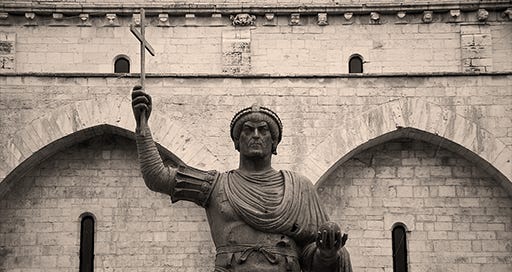8-13. Saint Ambrose and the Repentance of the Emperor
Maximus had fallen, and for a court orator his character possessed no redeeming feature. But from less prejudiced authorities we seem to gain a picture of a man whose only fault was his enforced disloyalty to Theodosius, and of an Emperor who shewed himself a vigorous and upright ruler, and who could plead as excuse for his avarice the pressure of long-threatened war with his co-Augustus. From these exactions which were perhaps unavoidable, Gaul suffered severely, and on his departure from the West, while Nannienus and Quintinus were acting as joint magistri militum, the Franks burst across the Rhine under Genobaudes, Marcomir, and Sunno and threatened Cologne. After a Roman victory at the Silva Carvonaria near Tournai, Quintinus invaded barbarian territory from Novaesium, but the campaign was a disastrous failure. On the fall of Victor Arbogast remained, under the vague title of Comes or Count, the virtual ruler of Gaul, while Carietto and Syrus succeeded as magistri militum the nominees of Maximus.
Arbogast on his arrival counselled a punitive expedition, but it would seen that Theodosius did not accept the advice. A peace was concluded, Marcomir and Sunno gave hostages, and Arbogast himself retired to winter quarters in Trier.
Valentinian remained with Theodosius in Milan during the winter of 388-9 and was with him on 13 June 389 when he made his solemn entry into Rome, accompanied by his five year old son Honorius. On this, apparently his only visit to the western capital he anxiously endeavoured to weaken the power and influence of Paganism, while he effected reforms both in the social and municipal life of the city. To the stern and haughty Diocletian the familiarity of the populace had been insufferable: Theodosius was liberal with his gifts, attended the public games, and won all hearts by his ready courtesy and genial humanity. In the autumn of 389 he returned to Milan, and there he remained during 390 — that memorable year in which Church and State met as opposing powers and a righteous victory lay with the Church.
In fact, he who would write of affairs of state during the last years of the fourth century must ever go borrowing from the church historians; he dare not at his peril omit the figure of the counsellor of Emperor after Emperor, Ambrose, the fearless, tyrannous, passionate, and loving bishop of Milan.
Though the conduct of Ambrose may at times be arbitrary and repellent, the critic in his own despite admits perforce that he was a man worthy of a sovereign's trust and confidence. The facts of the massacre of Thessalonica are well known. Popular discontent had been aroused by the billeting upon the inhabitants of barbarian troops, and resentment sought its opportunity. Botherich, captain of the garrison, imprisoned a favourite charioteer for gross immorality and refused to free him at the demand of the citizens. The mob seized the occasion: disappointed of its pleasure, it murdered Botherich with savage brutality.
The anger of Theodosius was ungovernable, and the repeated prayers of Ambrose for mercy were of no avail. The court circle had long been jealous of the bishop's influence and had endeavoured to exclude him from any interference with state policy. Ambrose knew well that he no longer enjoyed the full confidence of the Emperor. Theodosius listened to his ministers who urged an exemplary punishment, and the order was issued for a ruthless vengeance upon Thessalonica. The message cancelling the imperial command arrived too late to save the city. The Emperor had decreed retribution and his officers gave rein to their passions.
Upon the people crowded in the circus the soldiers poured and an indiscriminate slaughter ensued; at least 7000 victims fell before the troops stayed their hand. Ambrose, pleading illness, withdrew from Milan and refused to meet Theodosius. With his own hand he wrote a private letter to the Emperor, acknowledging his zeal and love for God, but claiming that for such a crime of headlong passion there must be profound contrition: as David listened to Nathan, so let Theodosius hear God's minister; until repentance he dare not offer the sacrifice in the Emperor's presence. The letter is the appeal of undaunted courage to the essential nobility of the character of Theodosius. The gusts of fury passed and remorse issued in penitence.
With his subjects around him in the Cathedral of Milan the Emperor, stripped of his royal purple, bowed himself in humility before the offended majesty of Heaven. Men have sought to heighten the victory of the Church and fables have clustered round the story, but the dignity of fact in its simplicity is far more splendid than the ornate fancies of any legend. Bishop and Emperor had proved each worthy of the other.
To obtain a deluxe leatherbound edition of THE CAMBRIDGE HISTORY OF THE BYZANTINE EMPIRE, subscribe to Castalia History.
For questions about subscription status and billings: library@castaliahouse.com
For questions about shipping and missing books: shipping@castaliahouse.com






I am curious about how St Ambrose and Theodosius would be viewed from an SSH lens. St Ambrose was an effective and loved leader even prior to being a catechumen, so I assume him to be an Alpha in addition to being a saint.
I’m inclined to think the same of Theodosius but I am less certain. If he was, I think that makes the submission of the Emperor to the Church, doing public penance, all the more interesting.